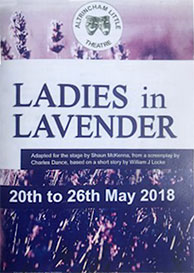Association of Community Theatre

LADIES IN LAVENDER
adapted by Shaun McKenna, from a screenplay by Charles Dance
based on a short story by William J Locke
Directed by Lisa Barker
Altrincham Little Theatre

The setting for this play is a Cornish village in 1936, where anything out of the ordinary becomes communal gossip. The extraordinary rarely happens but here, on a dark, stormy night, a shipwreck occurs and Andrea, a young Polish violinist, is cast into the sea. The morning after he is spotted on the beach by two aging spinster sisters, Janet and Ursula Widdington. Along with other characters these ladies care for Andreas, until the inevitable happens and he has to leave and carry on with his life plan.
The set, designed by Steve Smith, Polina Sparks and Alan Reidsma, had been thought out with levels built in to convey both the downstairs and upper storey of the house, as well as the garden space. All this was quite compact so that the many scenes could flow from one to the other with minimal time spent changing scenes. Each room had the right amount of props to convey its use, without it becoming cluttered. The top drawer of the sideboard must have been crammed with knitting by the end of the play!
The costumes were appropriate for the period. There were a number of changes for cast members to convey the time of day and events happening within it.
There was great interaction throughout between Barbara Steel (Ursula) and Cherill Wyche (Janet), the two spinster sisters who, at times, vied for the attention of Andrea. The light and shade in dialogue delivery cued you into the feelings that both had.
Cherill created the character of Janet, a practical, matter of fact person, who withheld a lot of emotion and “got on with it”. She had previously had a relationship but the war intervened. One got a sense that she had accepted the fact that her opportunity for love had been and gone, and that she had resigned herself to a life full of structure and order. The arrival of Andrea sparked an interest that this was a break from the ordinary but that it would not last. She became the voice of reason and restraint for her sister.
Barbara, in contrast, embodied the character of Ursula who had never known love, and was surprised by the feelings that the arrival of a young man into their lives had on her. She wanted to hold on to this feeling, and there were lovely moments where she held Andrea and came alive to his touch when he hugged her. The feeling of desolation through body language and expression when Andrea left was touching.
Thomas Christopher is a new face in this society for me. While there was little for him to do in Act 1 he developed his character from a shy and unsure person in a foreign place into an enthusiastic and passionate young man who was determined to fulfil his life plans by the end of the second act. He conveyed a range of emotions well by expression, voice and body language. This was a confident and assured performance.
The busy-body housekeeper, Dorcas, played by Julie Broadbent, added humour to this production with her interactions with the two testy sisters. She had developed a no-nonsense, tell it like it is character, but still had empathy and understanding of what was going on between the two siblings, and the feelings that the arrival of young Andrea had roused.
In a play like this, where you have different nationalities, you have to decide from an early stage whether accents are going to be used, there needs commitment to it throughout. Thomas and Julie were particularly good at this in their roles of Andrea and Dorcas.
Arthur Hulse and Paula Keen, Dr Mead and Olga Daniloff respectively, provided an opportunity for us to witness spurned advances which were more obvious than those that you felt Ursula was trying to communicate to Andrea.
Throughout the play there was the sense of infatuation, the sisters for Andreas, the doctor for Olga and the emptiness when they realise that it is futile, that they have no control over the objects of their desire, and that they have to accept that they all move on. This was quite evident during the last scene where those left in the village gather to listen to Andrea playing his violin on a radio programme.